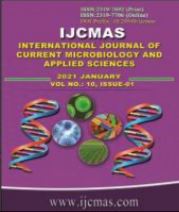


 National Academy of Agricultural Sciences (NAAS)
National Academy of Agricultural Sciences (NAAS)

|
PRINT ISSN : 2319-7692
Online ISSN : 2319-7706 Issues : 12 per year Publisher : Excellent Publishers Email : editorijcmas@gmail.com / submit@ijcmas.com Editor-in-chief: Dr.M.Prakash Index Copernicus ICV 2018: 95.39 NAAS RATING 2020: 5.38 |
A field experiment was conducted to find out the effect of treated distillery effluent (TDE) and bio-compost (BC) application on productivity of maize crop grown in vertisols having clay loam texture. Five levels each of organic fertilizers in main plot (control, TDE at 50 kL ha-1, TDE at 100 kL ha-1, BC at 5 t ha-1 and FYM at 12.5 t ha-1 + bio-fertilizers and inorganic fertilizers in sub plot (control, 50, 75, 100% recommended dose (RD) ofN (nitrogen) &P (phosphorus)and 100% RD of N+P+K (potassium) were tested in split plot design and replicated thrice. Application of TDE at100kL ha-1 along with either 100% RD of NPK or NP increased the grain and stover yield by 18.3–26.3 and 37.6–47.15% respectively, over control. However, this treatment was found comparable with FYM at 12.5 t ha-1 + bio-fertilizers along with either 100% RD of NPK or NP. Similarly, dry matter production was also found maximum with the application of TDE at 100 kL ha-1 and FYM 12.5 t ha-1 + bio-fertilizers. The growth and yield attributes of maize viz., plant height, leaf area index, cob length, cob girth, number of grain rows cob-1, number of grains row-1, number of grains cob-1, 100-grains weight and cob weight were significantly increased by TDE application and the highest values were recorded at 100kL ha-1 along with100% RD of NPK as well as NP fertilizers. TDE contain considerable level of plant nutrients which were made available to the plant, thus resulted in better growth and productivity yield of maize.
 |
 |
 |
 |
 |